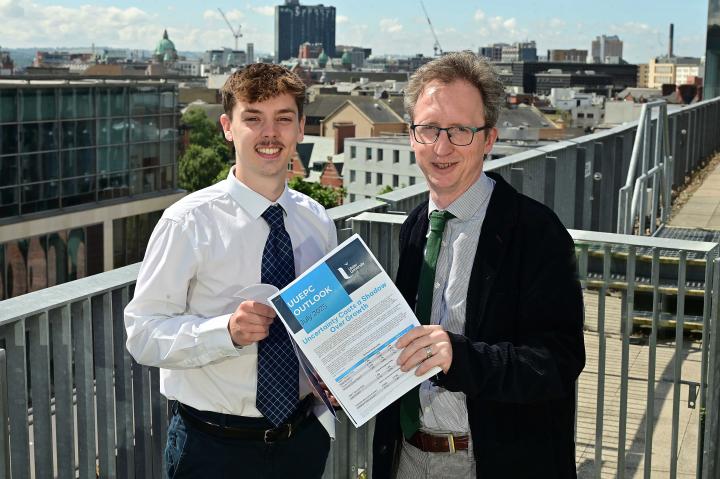
Business confidence has declined in recent months in the face of considerable domestic and global pressures, a new report by Ulster University’s Economic Policy Centre (UUEPC) has revealed.
The UUEPC Summer Outlook for 2025 finds that rising labour costs, driven by the increases in the Living Wage and employer National Insurance Contributions alongside broader wage inflation, as well as US trade tariffs and heightened geo-political tensions across Eastern Europe and the Middle East, are reflected in a weakening labour market, characterised by stalling employment growth.
The report finds that higher energy prices, among a range of other factors, have resulted in inflation which is stubbornly higher than the Bank of England’s 2% target, which has in turn, slowed the pace of interest rate reductions. However, it states, later in the year further cuts are expected with a move towards a long-term base rate of around 3.5% indicating improved conditions.
READ MORE: Lyons announces £670,000 investment to transform town centres across Mid and East Antrim
Dr Myles Patton, Principal Economist at the Ulster University Economic Policy Centre, said:
“We are seeing a business environment under significant pressure, shaped by domestic pressures and global uncertainty. Conditions are anticipated to slowly shift in a more positive direction, paving the way for a more growth-friendly environment.”
Assistant Economist, Todd Gowdy added:
“Ongoing uncertainty threatens to further dampen already subdued business investment. Raising capital investment levels is critical to securing long-term growth and competitiveness."
Whilst economic growth is expected to remain low this year, economists have explained that there is potential that it could pick up slowly in 2026 and beyond, with the increase in spending and in particular, capital spending, as announced by the Chancellor Rachel Reeves in her Autumn Budget, supporting growth at least into the medium term.
Economic growth is also supported by an improvement in productivity, after minimal productivity growth in the past two years.
Implications of Rising Protectionism for Northern Ireland
An unpredictable set of tariffs introduced by President Trump’s second administration, significantly increasing protectionist measures across US trade policy, has led to a 10% tariff now applied to most imported goods, with higher levies such as 25% on cars and car parts, and 50% on steel and aluminium.
Although these rates apply broadly, the UK has negotiated comparatively lower tariffs for key sectors like automotive and metal, offering some relief for exporters. While these tariffs raise the cost of NI goods in the US and may reduce their price competitiveness compared to domestic US products, NI might gain a relative advantage over countries facing steeper tariff rates.
Dr Myles Patton, continued:
“Beyond the direct impact on prices and competitiveness, wider economic concerns are mounting. The unpredictable nature of tariff implementation is creating uncertainty, which, in turn, is impacting investment and long-term planning.
“The spillover effects from slower global growth, driven by strained trade relationships and higher import costs, could also further affect the demand for NI goods.”
The overall effect on NI exports will depend on US domestic supply, consumer demand, and the ability of US importing businesses to absorb higher prices. With the US accounting for 16% of NI’s goods exports in 2024, and contributing 2.4% of NI’s GDP, compared to a UK average of 1.9%, any disruption to trade relations can pose significant regional economic risks.
READ MORE: Entrepreneurs called to write themselves into Northern Ireland’s business success story
Todd Gowdy concluded:
“With the UK economy particularly vulnerable to international downturns, NI exporters may also feel the consequences of broader impacts, including increased uncertainty and changing oil prices.”
Read the full Ulster University Economic Policy Centre: Summer 2025 Outlook report.
Sync NI's Summer 2025 magazine celebrates women in tech across Ireland as we continue to encourage more women to enter the thriving sector and address the current gender imbalance. Read the Summer 2025 Sync NI Magazine online for free here.